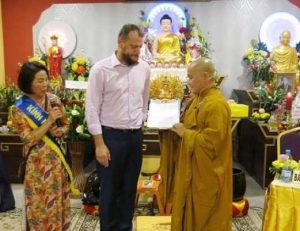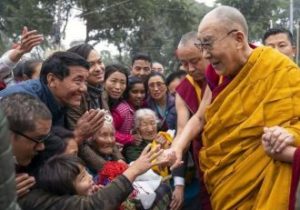Beginner’s Mind is a special project from BDG collecting insightful essays written by US college students who have attended experiential-learning courses related to Buddhism. Some of the authors identify as Buddhists, for others it is their first encounter with the Buddhadharma. All are sharing reflections and impressions on what they’ve learned, how it has impacted their lives, and how they might continue to engage with the teaching.
Cindy Yang wrote this essay for her Buddhist Modernism course at the University of Southern California. Cindy is a freshman triple majoring at USC in Economics, Religion, and Business Administration. Cindy is committed to connecting capital to socially responsible endeavors. Cindy enjoys studying languages, working out, meditating, and contemplating the big questions in life.

Shifting Perspectives: My Relationship with Religion and with Buddhism
Hailing from a multi-religious, interfaith, and atypical Chinese household, I grew up with my Buddhist parents, atheist grandfather, and Christian grandmother. I went to Sunday school with my grandmother, visited Buddhist temples with my parents, and learned atheist philosophies from my grandfather. As I grew up, I sought opportunities to volunteer with Tzu Chi, a Buddhist humanitarian organization, preserved the environment with local monks, and taught hundreds of underprivileged kids. Ultimately, I realized that religion doesn’t just serve as a set of beliefs but can be a portal into a more equitable and innovative society.
With this belief, I declared my religion major and registered for religion lectures. I took two different religion lectures last semester: REL 121, the world of the New Testament; and REL 301, introduction to the study of religion—gaining some in-depth perspectives on Western religions. This semester, I was hoping to learn more about Eastern religions, study the religious roots of my family (especially my parents,) and gain another non-religious but academic perspective into perceiving, analyzing, observing, and evaluating the functionality of Eastern religions, especially Buddhism.
I had tried meditation before. My parents built a small shrine with their good friends (Taiwanese and Tibetan monks and nuns) in Shanghai (what a combination!). With the smoldering incense and the harmonious sound of sutra recitation, I sat on my bodhi-mat and tried to meditate. In this process, my father chanted the Diamond Sutra and I closed my eyes to listen, think, and meditate. The process usually lasted 10–15 minutes, and I sometimes (sorry to say) fell asleep. While I was sometimes able to concentrate, I felt dizzy for the most part.
In this Buddhist Modernism class, however, things are different. I realized that I am now actively meditating, while before I was passively meditating. Now, I am trying to consciously concentrate my mind and thoughts together in the same place, but before I was just passively listening to my family’s chanting.
When Professor Zu first introduced me to mindfulness meditation, I was still finding it very hard to concentrate. My mind turned to many other random things during my first few attempts. In fact, other thoughts just slipped into my mind, and I couldn’t stop thinking about them: my border collie, unfinished homework, upcoming tests and quizzes, and my friends’ messages . . . things like these kept hovering around my head. After contemplating methods to keep me mindful and conscious during meditation, I practiced the RAIN meditation method,* found a safe and undisturbed place, and instructed myself to calm down, think, and meditate over a certain period of time.
The changes are obvious and observable. After months of successful meditation (failed practices), I became more conscious of what was going on around me. The period of time in which I was able to concentrate increased tremendously; I don’t nap all the time, I don’t feel dizzy for most of the day, but instead I live with an energetic body and a compassionate heart.
My words and actions also changed. I was previously very confused about the philosophy of emptiness in Buddhism. What is the meaning of life if everything is full of emptiness? To tackle this problem, I sought to learn the facets of religion in the lecture, regarding the relationship of religion with ecology, war, economics, education, politics, and many more topics.
To begin with, Buddhism and ecology are interconnected, as the Buddhist philosophies of promoting a heart of compassion, kindness, and tolerance can lead us to care more for the environment. Buddhism also justifies that religion is not merely about individual liberation but collective wisdom for the betterment of society through promoting love, mutual understanding, and sustainability.
Moreover, I learned about the relationship between politics and religion, as politics usually refers to constitutional power while religion is about spiritual power. But this spirituality is often utilized with political power. For example, contemporary Japanese Buddhist movements are explicitly socially engaged, with the aim of reaching world peace. Many practitioners do not isolate themselves but rather perform social work to ensure the sharing of their beliefs. I realized that religion itself is more than a spiritual belief: it is an interdisciplinary study that is deeply connected with every aspect of life.
In learning these, I became more cautious of how I spoke as I am aware that every word is impactful—it can be kind or hurtful. I also became more compassionate and tolerant toward my family, friends, and people from other cultures and religions, as I recognized that we share the same planet so it’s important to learn, to respect, to understand, and to treat each other kindly. I am also aware of the power of religion, which is much more than spirituality or belief. It can become a tool to provoke war and racial discrimination, a method to promote peace and mutual understanding, and a path toward a better self and and a better society.
I believe that religious literacy is the key to the 21st century, as our planet becomes more diverse and interconnected. I am very grateful for taking this class, making myself more religion-literate, enlarging my vision of the tremendous impacts of religion in different areas and fields, and broadening my perspectives and reevaluating my family background and myself. I look forward to continuing my study of, and interest in, Buddhism by reading the sutras and scriptures (I’m currently reading the Diamond Sutra), taking more related courses on Eastern religions, and promoting religious literacy to the general public by showcasing the importance of religion in contemporary society. I am especially interested in the relationship between ecology and economics and religious studies. I want to investigate how the ritual economy is impacting and impacted by religion, and how people should utilize different religions to construct a sustainable society for our planet.
Overall, I am thankful for this incredible opportunity to be able to take this course at this age, and I hope to continue my journey of being enlightened. I would describe this course as a doorway that has opened my world to Buddhism from an academic perspective, showing me different facets of the religion and pushing me to become a better person to construct a better society.
* RAIN meditation has four steps: 1. Recognize what is going on; 2. Allow the experience to be there, just as it is; 3. Investigate with kindness; 4. Natural awareness, which comes from not identifying with the experience.
Related features from BDG
Activism and Action on the Path of Engaged Buddhism
Connecting with Interconnection
Self-Compassion: Learning to Hear Myself











